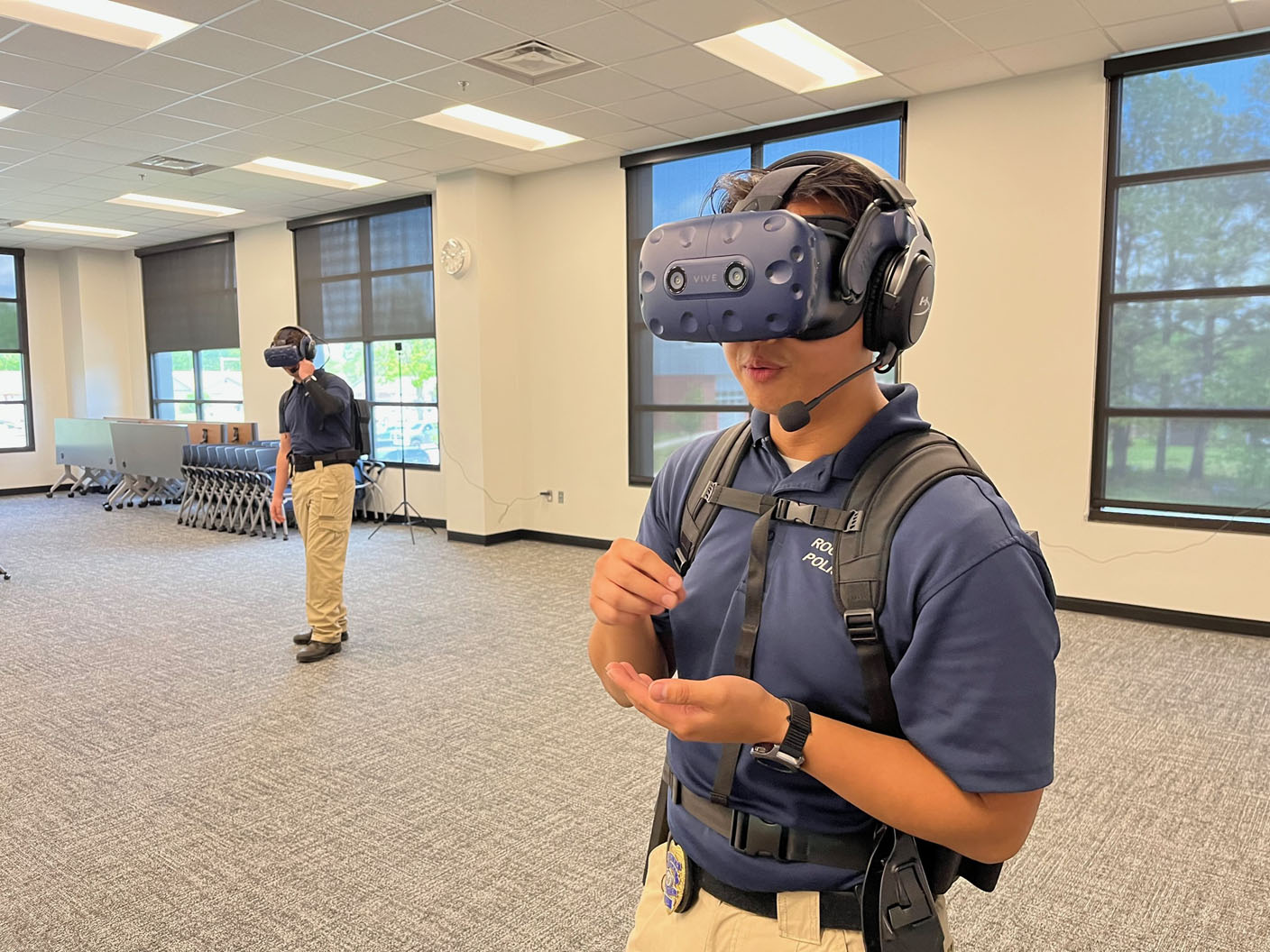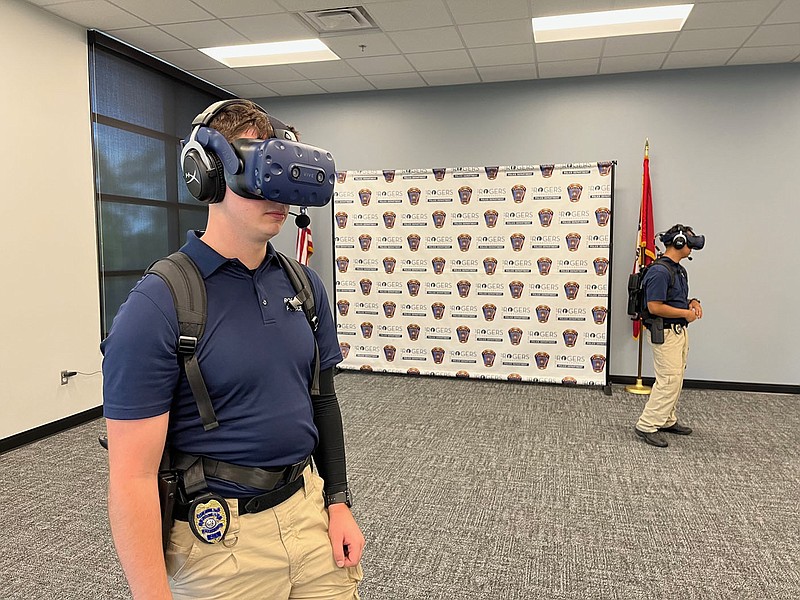ROGERS -- New virtual reality technology at the Police Department is providing enhanced scenario-based training in deescalation and crisis intervention that could save lives.
The department is the first law enforcement agency in Northwest Arkansas to use the Apex Officer virtual reality training simulator, according to Police Chief Jonathan Best.
The Pulaski County Sheriff's Office became the first agency in the state to implement the Apex Officer system last summer. The Maynard School District and municipal police departments in Van Buren and Tuckerman have also purchased the simulator, according to representatives of the Las Vegas-based company.
The city paid $73,912 for the Apex system, including two headsets, according to Finance Director Casey Wilhelm.
The technology creates a more immersive environment than many other training simulators, using a headset and earphones to create a 3D virtual environment, Best said. In contrast, a traditional simulator training for law enforcement uses a screen or a series of screens to create the training environment, he said.
Before the new Apex system, the Rogers department would write out training scenarios, and officers would wear masks and act as people within the scenario, according to Don Lisi, a training officer with the department.
The department adopted the virtual reality system in early March and has since completed four in-service training sessions with it, Lisi said.
In-service training is a series of lessons each officer has to take each year. The training involves online instruction as well as three days of in-person instruction that include defensive tactics, firearms training and building-clearing drills, he said.
The department's curriculum is approved by the state Commission on Law Enforcement Standards and Training; some of the training is required by the commission, and some is additional training required by the department, he said.
The Apex Officer technology has been "revolutionary" for the department's scenario-based training, which may be the most valuable training for experienced officers, according to Lisi.
During the training, an officer wears the system's computer in the form of a backpack, which is connected to a headset with earphones that cover the officer's eyes and ears.
Trainees can also be equipped with accompanying pistols, tasers, rifles or an all-purpose wand, which in a scenario could act as a baton or pepper spray, he said. The pistol appears similar to an airsoft gun with technology added for compatibility with the virtual reality system, he said.
The system doesn't simulate the recoil of firing a gun, though the experience of looking through the sights is surprisingly accurate, according to Lisi.
"I was very curious on how they would make that possible, and I don't understand how they did, but they did," he said. "You can look down your sights, and it's like looking down real sights. It's very, very realistic."
The earphones convey sound in directional stereo so that a sound in the virtual environment behind the officer's left side will sound like it is coming from that direction, he said.
The trainee can experience a wide variety of scenarios, which can involve interacting with another trainee and encountering people in different states of crisis.
A strength of the Apex Officer system is scenarios can be tweaked by trainers as the officer responds to the situation, according to Lisi. A training officer, sitting at a screen in the training room, may control seven or eight people within the virtual environment -- even with the ability to talk to the officer through them, he said.
Within the simulated world of the training, an officer may encounter someone in the middle of a mental health episode or respond to a domestic violence or public intoxication call, he said. Such encounters are common for the city's police, and they require officers to quickly determine how to respond, he said.
Other training simulators may be limited to scenarios where an officer has to use force, but the Apex training allows trainers and trainees to practice deescalating the situation, according to Lisi.
"If we can deescalate, we're doing our jobs right," he said. "The best day in law enforcement is when nobody gets hurt and everybody's compliant."
Lisi estimated at least 90% of the training scenarios officers have encountered through the VR system haven't required officers to draw their weapons, he said.
"Not every situation we respond to is a guns-drawn Hawaii Five-0 type thing," he said. "It's we show up, somebody's having a crisis and we have to put together the puzzle pieces on the fly and be able to determine how can we help this person."
Mark McGraw, training officer with Van Buren's Police Department, said the department recently received the Apex system and plans to implement it soon.
McGraw said he expects the system, in addition to providing immersive training, also will make it easier for officers to find time to train between calls.
Departments across the state are struggling to recruit and retain officers, for reasons including pay, competition among departments in neighboring cities and the public perception of police officers, he said.
It's difficult to get officers off the street for training when the department needs more officers to answer calls, he said. Further, inadequate training can be a liability issue for a department, he said.
With the Apex system, which can be set up quickly and doesn't require a lot of space, Van Buren officers will be able to receive an hour of scenario-based training between answering calls, he said.
The system can cost around $70,000, which is more than many departments are able to afford, according to McGraw. The Van Buren department received a grant for the simulator, he said.
"Opening it was like Christmas Day," he said.
 Officers Dillan Stephens (left) and Pietrie Yang (right) participate in a scenario-based training session on Friday, April 21, 2023, through the Apex Officer virtual reality training simulator at the Rogers Police Department. The department is the first law enforcement agency in Northwest Arkansas to adopt the Apex simulator. (Garrett Moore/NWA Democrat-Gazette)
Officers Dillan Stephens (left) and Pietrie Yang (right) participate in a scenario-based training session on Friday, April 21, 2023, through the Apex Officer virtual reality training simulator at the Rogers Police Department. The department is the first law enforcement agency in Northwest Arkansas to adopt the Apex simulator. (Garrett Moore/NWA Democrat-Gazette) Officer Pietrie Yang (right) pretends to write down a citizen's name while participating in a scenario-based training session on Friday, April 21, 2023, through the Apex Officer virtual reality training simulator at the Rogers Police Department. The department is the first law enforcement agency in Northwest Arkansas to adopt the Apex simulator. (Garrett Moore/NWA Democrat-Gazette)
Officer Pietrie Yang (right) pretends to write down a citizen's name while participating in a scenario-based training session on Friday, April 21, 2023, through the Apex Officer virtual reality training simulator at the Rogers Police Department. The department is the first law enforcement agency in Northwest Arkansas to adopt the Apex simulator. (Garrett Moore/NWA Democrat-Gazette) Training officer Don Lisi leads officers through a scenario-based training session on Friday, April 21, 2023, using the Apex Officer virtual reality training simulator at the Rogers Police Department. During the session, Lisi spoke into a microphone and controlled virtual citizens who interacted with trainees, tweaking the scenario based on the responses of the officers. The department is the first law enforcement agency in Northwest Arkansas to adopt the Apex simulator. (Garrett Moore/NWA Democrat-Gazette)
Training officer Don Lisi leads officers through a scenario-based training session on Friday, April 21, 2023, using the Apex Officer virtual reality training simulator at the Rogers Police Department. During the session, Lisi spoke into a microphone and controlled virtual citizens who interacted with trainees, tweaking the scenario based on the responses of the officers. The department is the first law enforcement agency in Northwest Arkansas to adopt the Apex simulator. (Garrett Moore/NWA Democrat-Gazette)How much did it cost?
The Rogers City Council unanimously approved buying the training simulator from Govred Technology Inc. of Las Vegas at its Feb. 28 meeting. The Police Department was allowed to use up to $73,913 for the purchase. Money for the equipment was accounted for in the citys 2023 budget, which the council approved in November.
Source: Rogers Police Department

